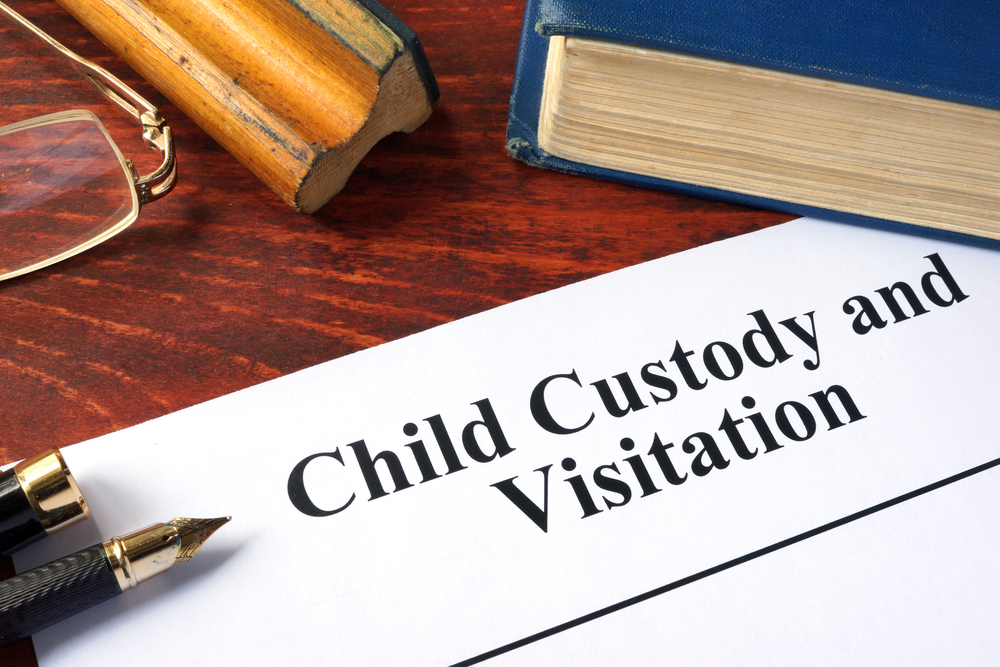Please note that all online divorce platforms are not the same. Much of the content below does not apply to BlissDivorce. BlissDivorce is the only complete online divorce solution, including property division, child custody, spousal support, and AI-powered Digital Divorce Mediation.
Going through a divorce is a complex and often stressful process. If you have children, you must also make a co-parenting plan based on what is best for them.
That said, online divorce is becoming very popular among divorcing parents. This is because it is a convenient and cost-effective way of handling legal matters.
Read on to learn more about online divorce and custody agreements. This article will provide you with some tips on co-parenting and making a schedule that works for both of you.
Online Divorce, Custody Agreements, & Co-Parenting
Online divorce
Online divorce has become very popular in recent years. It is an efficient and convenient alternative to traditional divorce.
Online divorce services, such as BlissDivorce, guide you through the online divorce process. They save you time and money and provide the necessary support attorney-free.
Our Digital Divorce Mediation technology might help you share and divide your property, debts, and custody duties. BlissDivorce gives you and your spouse a separate dashboard to include necessary data about different aspects of the divorce agreement. This involves child custody, alimony, property division, and other matters.
The online divorce platform makes the whole process much easier, enabling easy data entry for custody arrangements and any type of asset that you have.
As an online platform, it can help both parties make custody agreements and visitation arrangements without needing an attorney. This is not only an advantage for the parents but is also beneficial for the children.
With an online divorce, the children will get over the process much more easily as they won’t have to witness court arguments between their parents.

Source: shutterstock.com / Photo Contributor: Davizro Photography
Custody agreement
Once you decide how to divide your assets, you and your spouse should make a child custody and visitation agreement.
BlissDivorce enables you and your spouse to decide and manage your children’s education and healthcare needs.
This also includes specifying with whom the children will spend most of the time, how vacations and holidays will be handled, etc.
The platform also enables you to create a schedule that works for everyone. BlissDivorce guides you through the divorce process and enables you to voice any concerns that you have.
Child custody
Child custody refers to the responsibility the parents have to take care of their children. When discussing custody, it is important to note there are two types of custody – physical and legal custody.
Physical custody
Physical custody refers to which parent the children will spend most of their time with. Hence, there is joint physical and sole physical custody. If both parents have joint physical custody, it means that the children will live with each parent for a certain amount of time.
If one parent has sole physical custody, it means that the children will live with one parent. However, the other parent gets to visit the children through scheduled visitations.
By visiting, they will still be involved in the child’s upbringing. Keep in mind that the percentage of time your child is with you may impact the child support you get or pay.
Hence, you and your ex-partner should decide whether you will share physical custody. You will also need to decide what percentage works for you.
Legal custody
Legal custody refers to the responsibility of making decisions for children’s welfare. They include health choices, as well as religious and educational decisions. Just as it is the case with physical custody, there is also joint and sole legal custody.
Hence, you and your partner can decide about your child’s life together or decide on one parent to make such major decisions.
Co-parenting
Co-parenting refers to both parents playing an active role in the children’s lives.
To successfully navigate co-parenting, parents need to cooperate in every aspect of raising their children. Hence, divorcing parents need to be willing to communicate and make decisions that will benefit both parties.
That said, with online divorce platforms, overcoming issues and making joint parenting decisions is much easier. However, you will need to approach co-parenting with care to establish a healthy co-parenting relationship.
This involves making child-centered decisions, maintaining communication with the co-parent, being willing to be flexible, and setting your emotions about your partner aside.
Tips for Navigating Co-Parenting for Divorced Parents
Divorce can get even more stressful when it comes to making custody arrangements. Yet, by taking essential steps, you can navigate co-parenting in a successful manner. And as a result, provide the best outcomes for your children.
Let’s get into more detail about online divorce and custody agreements.
Parenting plan
One of the steps to take to navigate co-parenting is to create a comprehensive parenting plan. When filing for a divorce, it is necessary to provide all the details.
Hence, the parenting plan should outline the responsibilities of each parent. This includes visitation schedules as well as custody arrangements.
The plan should include how you and your partner will communicate with each other. Mention how you will resolve any occurring conflicts and how you will handle any changes to the plan.
When creating a parenting plan, it is necessary to keep the best interests of your children in mind. Work with your spouse to create a plan that will benefit you and your children.
This step might not be easy. Yet, a key thing is separating your relationship with your ex from the co-parenting one. Think about what will be the best for your children rather than what happened between you.

Source: shutterstock.com / Photo Contributor: fizkes
Communicate with your children
The divorce process might negatively impact the children. Because of this, it is important to be patient and understanding. Encourage your children to express how they feel.
After the separation, there will be a lot of changes in everyone’s lives. Your children may also have a lot of questions. Make sure to answer them and be as honest as possible.
Ask them to share information that will benefit the custody arrangements. Make sure to involve your children in the decision-making process when appropriate.
Doing so will make them feel more involved in the process. However, this applies to older children of over 12 years who are conscious and understand the situation.
Besides that, you should resolve your issues with your ex away from your children. Don’t involve them in your issues, and don’t use them to convey messages to your ex-spouse during a conflict.
It is also advisable not to talk about your ex-partner in a negative way or make your children choose a side. Still, you should inform the children about any changes impacting their lives.
Collaborate with your partner
Aside from talking to your children, it is crucial to communicate with your partner. Turn your emotions aside to make decisions that will give the best outcome for your children.
You also must inform each other about changes in the children’s schedule. As children grow with time, their needs will change, so it might be necessary to change the parenting plan.
A key to successful communication is to remain respectful. Try to keep this attitude even in times when disagreements occur. Discuss to make compromises and come up with solutions that will benefit everyone.
Aim for conflict-free communication. To achieve that, you need to talk in a slow manner, communicate any issues, and try to understand their point of view. Make requests instead of statements that can sound like demands.
Be flexible and adaptable
An essential factor of co-parenting is being flexible. It is also vital to be transparent about parenting time. Have a backup plan if the other parent has an emergency or is running late to pick up the child.
Spending time with children at an equal time sounds like a fair solution. Yet, that might not always be possible. For instance, one parent might work more than the other. In other cases, the child might be breastfeeding, or you might live far from your ex-spouse.
Keep in mind that co-parenting is an ongoing process. Hence, adaptability is crucial for success. Establish rules for your children. Such rules include homework, free-time activities, and others. It is advisable to establish similarities between the two households.
Make sure there is consistency between the children’s schedules. The same applies when it comes to rewarding them for good behavior or when you are disciplining your children.
Aim to make decisions you both agree on. This involves decisions about the children’s education, attending appointments, shared expenses, etc.
Seek support
When it comes to online divorce and custody agreements, make decisions you are certain of.
Separating from your partner can be challenging, so you must have a support system in the process. This includes talking with family members and friends.
Make sure to take care of yourself. One way to do so is by resting and implementing healthy lifestyle changes.
Co-Parenting Benefits in Children
Children whose parents cooperate with each other despite the end of their marriage:
- Adjust to the living situation much faster
- They know what to expect from co-parenting
- They are more likely to learn how to solve problems by themselves
- Are less likely to suffer from anxiety and stress
Crucial Things to Know About Online Divorce and Custody Arrangements
To navigate co-parenting, you should maintain transparent communication with your ex-partner. Let them know about any changes, and inform them about vital parts of the child’s life.
Get ready to make compromises when necessary. An important aspect of co-parenting is consistency and organization. Once you and your partner have created a schedule that works for everyone, make sure to stick to it.
This includes making arrangements for important events such as holidays and birthdays. This is also the time to set any boundaries you have.
If possible, you can also schedule regular meetings with the co-parent. The goal is to relook the plan and ensure everything works well for everyone involved.
That said, make sure to take the children’s needs into consideration. Online divorce is convenient and can be suitable for all couples with children of any age.

Source: shutterstock.com / Photo Contributor: Vitalii Vodolazskyi
Final Thoughts
In conclusion, online divorce and custody agreements can be effective. They are fast and cost-efficient for couples looking to end their marriage.
By taking essential steps, you can be effective in navigating co-parenting. These involve making a detailed parenting plan, communicating, and being flexible.
BlissDivorce has a complete custody form where you and your spouse can divide the custody obligations, as well as choose meeting days, times, and alimony.



